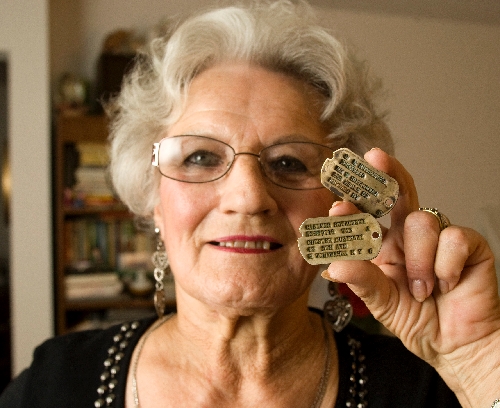Dog tag remarkably returns
Henrietta Rutkowski's story is a tale of two dog tags: One that her husband, Casey Rutkowski, kept for 66 years until he died at their Henderson home last year. And the other that he lost in the Solomon Islands during World War II.
That tarnished, metal tag with a notch at one end and his name "C L RUTKOWSKI" stamped above his Army serial number was delivered to her last week by a Navy lieutenant from Washington, D.C.
She fought back tears when Mike Hanzel of the Navy's Judge Advocate General Corps returned Casey's lost identification tag.
"It's too bad it wasn't found when he was alive. He would have appreciated it," she said, her voice cracking last week as she recounted her feelings.
"He was such a private man. Very seldom did he say anything about the war and where he was."
The dog tag Hanzel gave her was different from the one he kept for most of his life. That one had his name, "CASIMIR RUTKOWSKI" spelled out in capital letters and listed his brother, Chester Guzinski, as next-of-kin. Both tags contain the signature World War II notch, which was used to hold them in place while a machine imprinted them on carbon-paper medical forms.
The missing tag began its 12,000-mile homeward odyssey earlier this year.
Hanzel's childhood friend, Jeff Allen of Richmond, Va., had spent several months this year working for a nonprofit group, Youth with a Mission, at the Solomon Islands' village of Munda, on the west side of New Georgia Island. That's where U.S. Army soldiers used flamethrowers and machine guns to fight the entrenched Japanese Imperial army in the summer of 1943 to gain control of an airstrip. A young man from the island who works at what is now the Munda Airport, one day found the "C L RUTKOWSKI" tag. He gave it to Allen in February to return it to the solider's family.
"I thought maybe he was killed in action," Allen said by phone. "I didn't think we'd ever find anyone it belonged to."
When Allen returned to Virginia in August, he gave it to Hanzel who followed a trail of Army records and Google searches. The tag's next-of-kin address for a "MR W RUTKOWSKI" led him first to a 1940s neighborhood in Buffalo, N.Y., and eventually to the front door of Rutkowski's Henderson home with the help of Catholic Church records and an obituary that mentioned Henrietta Rutkowski as a survivor.
"It was sad I missed him by less than two years. I wanted to hand it to him personally," Hanzel said.
In a story about the lost tag that was written for a JAG officers publication, Hanzel described when he first reached Henrietta by phone.
"It is hard to describe the emotion of the moment as I related to her what I was ... holding in my hand, and where it had been found. Suffice to say, to return an object like that to the widow of a World War II veteran, so long after it has been lost, is as gratifying an experience as any I have had," he wrote.
While serving in the Asiatic-Pacific theater, Pvt. Rutkowski had his dog tags changed to show his brother, Chester Guzinski, as his next-of-kin, instead of his father, Wladyslaw Rudkowski, a Polish immigrant who had left his children in a Buffalo, N.Y. orphanage. It's the second tag that he carried with him back to the States.
Hanzel initially thought Pvt. Rutkowski might somehow had been involved in the Battle of Munda Point, a two-week encounter that ended when U.S. soldiers overran the airstrip in August 1943.
According to his Army separation papers, Pfc. Casimir L. Rutkowski didn't arrive in the Solomon Islands theater until Dec. 30, 1943. He was a rifle sharpshooter and laborer with the 284th Quartermaster Corps Refrigeration Company. He was there to rebuild and defend the tiny airstrip that became a stepping stone in the American effort to put bombers within striking distance of Japan.
A black-and-white photo from about that time shows him as a carefree, shirtless, 19-year-old soldier peering from beneath a jungle hat while gripping the nose of a freshly caught, 7-foot-long shark. He also kept a monkey as a pet, and would hunt alligators with his buddies to get meat for dinner, his wife said.
"The only thing he talked about is that alligator they caught and this shark," she said.
Later, sometime between October 1944 and September 1945, his unit joined Gen. Douglas MacArthur's operations near Leyte to free the Philippines from Japan's grip.
His honorable discharge paper from Christmas Day, 1945, shows he earned a Philippine Liberation Ribbon with one campaign star.
That means he either engaged the enemy during the campaign on Leyte or came under enemy fire during operations in or around the Philippines. There were more than 15,500 casualties in the Leyte campaign including more than 3,500 who were killed in action.
"I think he saw so much and it upset him so much," said Henrietta Rutkowski. She married him in 1978, the year before they moved to the Las Vegas Valley after he retired from his civilian job with Ford Motor Co. in New York.
"He couldn't believe in killing anyone, and I think it really upset him," she said.
"He would never go to celebrate Veterans Day. He'd say, 'No I'm not going, Honey. You go. There's too many unhappy memories for me.' "
Casey Rutkowski died at age 84, on March 16, 2009.
He took the answer to the mystery of the two sets of dog tags and how one was lost to his grave at the Southern Nevada Veterans Memorial Cemetery in Boulder City.
Contact reporter Keith Rogers at krogers@review
journal.com or 702-383-0308.

















